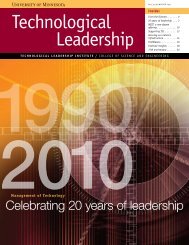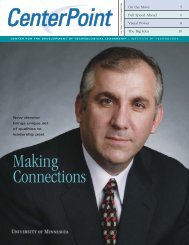Critical - Technological Leadership Institute - University of Minnesota
Critical - Technological Leadership Institute - University of Minnesota
Critical - Technological Leadership Institute - University of Minnesota
You also want an ePaper? Increase the reach of your titles
YUMPU automatically turns print PDFs into web optimized ePapers that Google loves.
The study <strong>of</strong> complex adaptive systems stands to enhance<br />
the management <strong>of</strong> technology<br />
Rich Ground<br />
Dr. Lockwood Carlson has spent much <strong>of</strong> his career in the<br />
search to understand and marshal the potential <strong>of</strong> new technology.<br />
In his work, Pr<strong>of</strong>. Karl Smith has explored ways to<br />
build knowledge management systems that provide the foundation<br />
for future innovation.<br />
When Carlson and Smith began talking about the concept <strong>of</strong> complex adaptive<br />
systems (CAS), they found exciting and fertile ground to investigate and share with<br />
students who are pursuing their Master <strong>of</strong> Science in the Management <strong>of</strong> Technology<br />
(MOT) at the Center for the Development <strong>of</strong> <strong>Technological</strong><br />
<strong>Leadership</strong> (CDTL).<br />
“As a physicist, I’m always looking for robust ways to<br />
apply the scientific tools <strong>of</strong> the MOT,” says Carlson. “I am<br />
very skeptical <strong>of</strong> any concept or business application that<br />
promises easy answers. CAS starts to acknowledge the<br />
complexity <strong>of</strong> the unexpected.”<br />
Carlson knows firsthand the challenges <strong>of</strong> pursuing<br />
breakthrough technology. A former 3M corporate scientist,<br />
Lockwood Carlson<br />
Carlson continues to advise technology companies as<br />
president <strong>of</strong> Carlson Consulting LLC. As the James J. Renier Visiting Land Grant Chair<br />
in <strong>Technological</strong> <strong>Leadership</strong>, he teaches innovation, product development, and<br />
technology forecasting courses in MOT, as well as short courses for CDTL.<br />
In his project management class, Smith takes a survey to gain an understanding<br />
<strong>of</strong> his MOT students’ knowledge <strong>of</strong> key topic areas. In a recent survey, he found only<br />
a few students reported any familiarity with CAS, but to Smith that provided an<br />
opportunity to enhance the learning <strong>of</strong> his MOT students.<br />
A Morse-Alumni Distinguished Teaching Pr<strong>of</strong>essor and civil engineering pr<strong>of</strong>essor<br />
at the <strong>University</strong> <strong>of</strong> <strong>Minnesota</strong>, Smith leads project and knowledge management<br />
courses in MOT. Smith has made his mark in advancing engineering education<br />
and project and knowledge management. Smith also holds an appointment as<br />
Cooperative Learning Pr<strong>of</strong>essor in Engineering Education at<br />
Purdue <strong>University</strong>.<br />
“This is the sort <strong>of</strong> area that faculty in MOT should think<br />
and talk about,” says Smith. “It may seem a little bit out<br />
there, but it is promising in its potential impact.”<br />
Only a few decades ago, scientists at the Santa Fe <strong>Institute</strong><br />
used the term complex adaptive systems to describe the cases<br />
<strong>of</strong> diverse and interconnected complex systems that have the<br />
ability to change and adapt from interactions and experience. Karl Smith<br />
Examples <strong>of</strong> CAS include the stock market, the ecosystem,<br />
cells and other biological systems, and work teams, to name a few.<br />
The CAS framework looks at the behavior and interactions within systems that are<br />
acting and reacting and changing and adapting. CAS ideas and models relate closely<br />
to both systems theory and the Darwinian principles <strong>of</strong> evolution.<br />
The CAS framework<br />
looks at the behavior<br />
and interactions within<br />
systems that are acting<br />
and reacting and changing<br />
and adapting. CAS ideas<br />
and models relate closely<br />
to both systems theory<br />
and the Darwinian<br />
principles <strong>of</strong> evolution.<br />
Fall 2007








